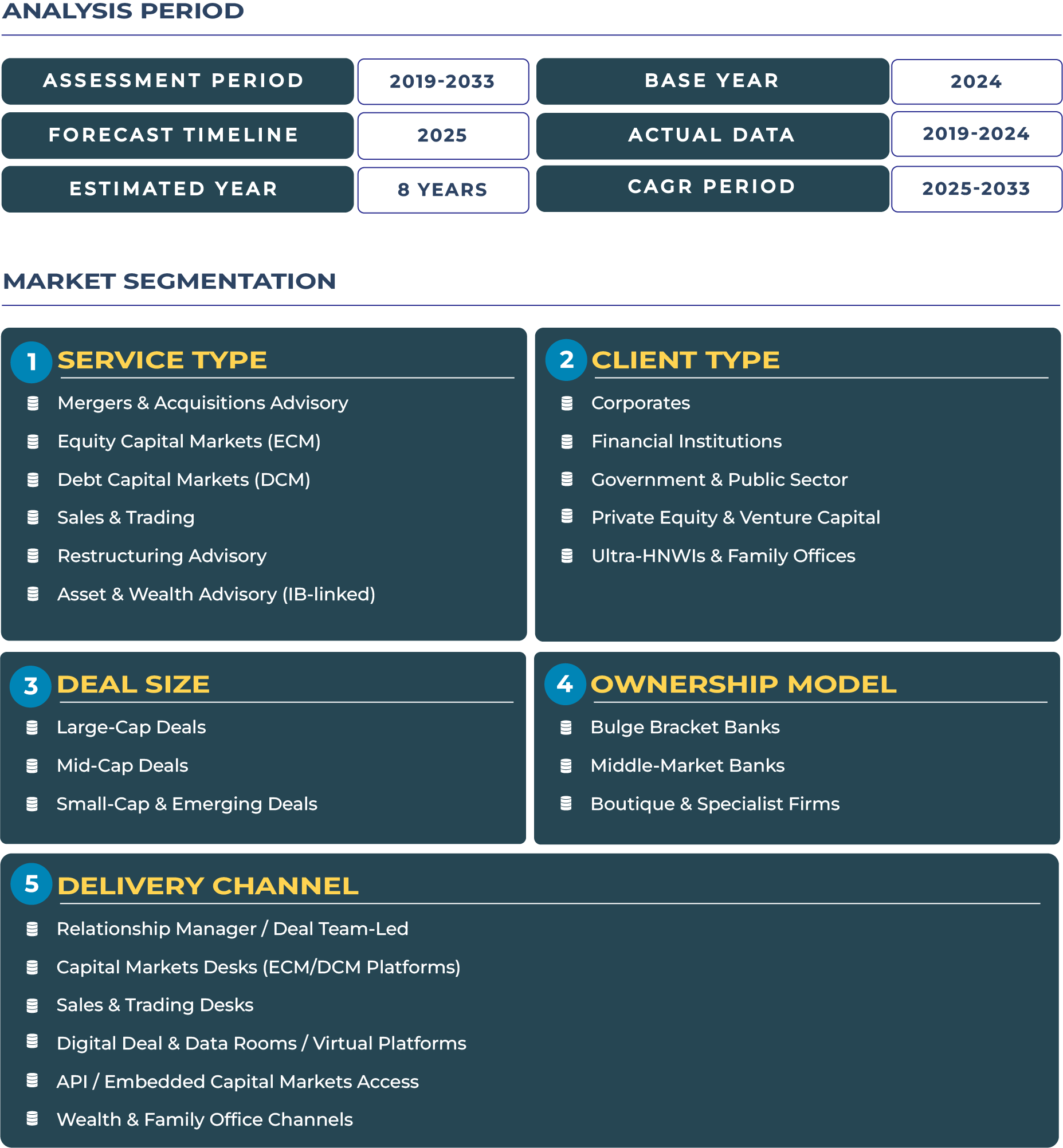South Africa Investment Banking Market Outlook: Navigating Mining-Led Growth and Corporate Advisory Evolution
The South African Investment Banking Market is entering a transformative decade shaped by its deep-rooted corporate ecosystem and mineral wealth. As Africa’s most industrialized economy, South Africa remains the financial and corporate hub for Sub-Saharan Africa, positioning Johannesburg and Cape Town as pivotal nodes for capital market activity and advisory services. In 2025, the South African Investment Banking industry is estimated to be valued at USD 768.6 million, projected to reach USD 877.1 million by 2033 at a modest CAGR of 1.7%. This slow but stable trajectory reflects both macroeconomic headwinds and structural opportunities in sectors such as mining, energy, and corporate finance advisory.
Note:* The market size refers to the total revenue generated by banks through various services.
The market’s evolution is deeply intertwined with South Africa’s economic composition, dominated by extractive industries, financial services, and infrastructure development. As the country transitions through periods of political and currency volatility, investment banks are recalibrating towards specialized corporate advisory, debt capital markets, and asset-linked financing. These services increasingly cater to mid-sized corporates, mining houses, and renewable energy projects, aligning with the government’s strategic push for sustainable industrial growth under the Government of South Africa’s economic revitalization initiatives.
Mining and Corporate Advisory at the Core of South Africa Investment Banking Future
South Africa’s mining legacy continues to define its financial structure, shaping demand for corporate advisory and debt structuring services. The steady demand for minerals, coupled with ongoing investments in renewable and energy infrastructure, keeps the country investment banking sector relevant within regional and global financial networks. The mining-led corporate advisory segment contributes significantly to transactional revenues, especially across merger and acquisition and restructuring advisory services, which remain active amid commodity price fluctuations.
Johannesburg, home to the South African Reserve Bank, serves as the financial epicenter, facilitating access to regional capital and cross-border deals with neighboring economies. The long-term market outlook remains cautiously optimistic as international investors regain confidence in the South African macroeconomic landscape following structural fiscal reforms. Despite modest growth, the industry benefits from its strategic location as a gateway for pan-African expansion and the increasing importance of energy transition projects, which are attracting advisory and capital market mandates.
Drivers & Restraints: The Interplay Between Corporate Strength and Economic Volatility
Driving Forces: South Africa’s Corporate Hub Status and Resource-Backed Economy
As the largest Sub-Saharan corporate and financial hub, South Africa investment banking sector draws strength from its diversified corporate base. The growth of debt capital markets is supported by corporate issuances from energy, mining, and telecom sectors, while equity capital markets see sporadic activity through secondary listings and share placements. The country’s strong legal and financial infrastructure, underpinned by regulators such as the Financial Sector Conduct Authority (FSCA), enhances investor confidence and facilitates complex cross-border transactions.
Furthermore, South Africa’s position as a resource powerhouse fuels deal-making across restructuring advisory and project financing. The ongoing transition towards cleaner energy has stimulated activity in renewable energy advisory, particularly in wind and solar portfolios. The rise of regional investment flows from Middle Eastern and Asian investors into South African assets also underpins a positive demand outlook for structured finance and private placement services.
Restraining Factors: Political Uncertainty and Currency Volatility
Despite its advantages, the South African investment banking landscape faces structural impediments. Persistent political uncertainties, coupled with load-shedding and policy inconsistencies, have constrained deal momentum. The South African rand’s volatility further discourages foreign capital inflows, impacting cross-border financing transactions. Limited new listings and subdued corporate expansion add pressure on equity capital markets, reducing revenue diversification for leading investment banks. Moreover, credit risk aversion among financial institutions has slowed debt syndication and project financing in key infrastructure projects, creating a cautious investment environment.
Trends & Opportunities: Fintech-Enabled Advisory and Energy Transition Mandates Redefine the Landscape
Emerging Trend: Fintech and Cross-Border Advisory Integration
A defining trend reshaping the market is the rise of fintech-driven investment advisory platforms that streamline execution and enhance transparency in transactions. South Africa’s growing digital ecosystem, supported by leading fintech hubs in Johannesburg and Cape Town, enables smaller firms to access institutional-grade advisory services. This digital evolution complements traditional investment banking offerings by integrating analytics, compliance automation, and risk management tools that enhance client service efficiency.
Opportunity Focus: Mining, Energy, and Corporate Advisory Expansion
The South African market presents high-value opportunities in advisory for mining and energy projects, particularly as international ESG mandates require banks to align financing with sustainability objectives. Cross-border merger and acquisition opportunities are also emerging as local companies expand into East and West Africa, demanding sophisticated advisory structures. With increased government focus on public-private partnerships (PPPs) in renewable energy and transport sectors, investment banks have an expanding role in PPP financing and infrastructure advisory, a segment projected to attract significant private capital by 2030.
Competitive Landscape: Local Champions and Global Players in a Transforming Market
South Africa investment banking ecosystem features a blend of domestic powerhouses and multinational institutions. Prominent local players such as Standard Bank Group and Absa Capital dominate in project finance, DCM, and corporate advisory, leveraging their vast regional networks. Meanwhile, international banks such as HSBC and Citigroup maintain a selective presence, primarily targeting cross-border merger and acquisition and financing mandates.
Strategically, leading banks are developing dedicated mining and energy advisory teams to capture the country’s industrial core. Standard Bank, for example, expanded its energy advisory division in 2024 to support renewable transition financing, emphasizing the shift towards sustainable investment mandates. The competition is further intensified by fintech-based investment advisory entrants that enhance digital structuring and execution capabilities across ECM and DCM operations.







